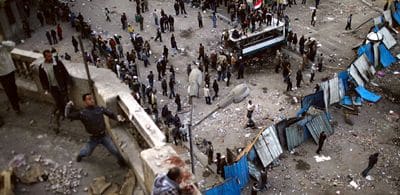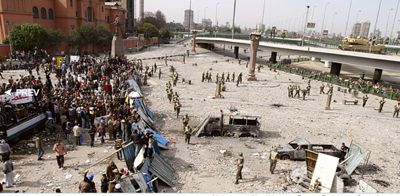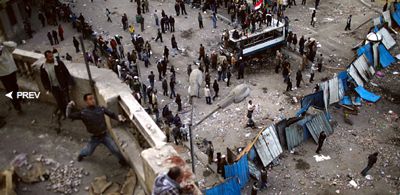
Well it was bound to happen. You draft an article on a swiftly moving uprising in another land and circumstances make it obsolete before you can even get it written. You cancel flights 48 hours in advance of an ice storm that dribbles rain over New York leaving a devastating swath of mist in its wake which threatens to pile up in huge banks of bird-disorienting and road-sign-obscuring fog, crippling the roving spotlight industry and sending sales of binoculars at B&H plummeting. You tell yourself you won’t write again for an imperious martinet of an editor only to find yourself with a hot new idea that simply can’t remain unwritten. And you think about what people might say about you: are you being molded by events or are they being molded by you? Just who is in charge here? And as the idea chases its own tail inside your head, you realize that you are that imperious martinet and that that other imperious martinet doesn’t even exist, for, even before this moment, it was you all along.
Welcome to democracy. It’s all well and good for us in the West to weigh in on the developments going on in Egypt, but before we do, it might do to come clean about really what we’re talking about here. For the vast majority of us, democracy is scenarios like the above: imperceptible shifts that, in the absence of a defining structure (yes, there are laws – how many times did you have to remind yourself today, “ooh, yikes, got to watch out for that, came close to breaking the law there”?), interact in fluid combinations to vastly magnify the impact they might otherwise have. And while it might seem, well, unseemly to distill this from an unwritten article predicated on the idea that while democracy was an unlikely shift for Mubarak what was important was that it could happen, is happening. is being passionately waged on. But that itself doesn’t necessate that it will come to pass…
Consider the political world which is the modus operandi of the Middle East, that Apple Computer, that Silicon Valley of nanopolitik, its political culture more developed in its strategizing, more knowing in its maneuvering than any pipsqueak US president could ever hope to be. (This of course is not to claim a golden age; America and New York in particular’s world-beating enterprise in the development of racial nuance connotes something a little less than pride in its legacy of necessity over prescience. While the Middle East may have an ear to politics so finely tuned to strategies of asymmetry, media manipulation, decentralization and miscellaneous branding and zone-flooding to make it nothing short of avant-garde in its sophistication, a China of political science, that does not make its players Solomon.) Nothing would have been less likely from Anwar Sadat, the temporary inheritor of the mantle of Pan-Arabism then a peace treaty with Israel. Then, too, Begin was a hawk, Rabin was a general and the villain of Sabra and Shatila himself Ariel Sharon oversaw the dismantlement of the Gaza settlements. To suggest a gray-scale continuum of political consciousness, as the recent US media “first draft of history” narrative had been doing, goes against a, dare I say it, more natural, catastrophist view of people and the abrupt, sudden, shocking, unexpected, contradictory ways in which they change and argues against this history.
But now that’s changed. With the violence that’s occurred, Mubarak is dangerously close to










